
Texas Health Resources

Audio By Carbonatix
The Supreme Court will not hear arguments as to whether Texas’ abortion ban conflicts with federal emergency healthcare laws, marking a victory for Texas Attorney General Ken Paxton and a setback for reproductive rights advocates and the Biden administration.
Following the Dobbs ruling that overturned Roe v. Wade, the Biden administration challenged Texas’ sweeping abortion bans under the Emergency Medical Treatment and Labor Act (EMTALA). In the challenge, the administration argued that the act requires hospitals to treat any patient critically in need of care – including women who need abortions in states with strict bans – or risk losing federal funding. Texas sued to block the guidance, a decision that was upheld by the New Orleans-based 5th U.S. Circuit Court of Appeals in January.
Paxton, who filed the lawsuit against the U.S. Department of Health and Human Services in 2022, claimed the president sought to “transform every emergency room in the country into a walk-in abortion clinic.”
The appeals court stated in its decision that EMTALA does not require any specific type of care.
The Supreme Court’s refusal to weigh in on whether federal healthcare guidance supersedes state law has left abortion-rights advocates, like the Dallas-based Afiya Center, “absolutely furious.”
“The Supreme Court is enabling the state of Texas to ban emergency abortions. Despite their claims that Texas’ abortion ban allows for exceptions in the case of the life and health of the mother, this could not be any further from the truth,” the Afiya Center said Monday in a statement shared with the Observer. “Today’s ruling will result in an increase in our already miserable maternal mortality and infant mortality rates.”
Texas’ abortion ban currently allows for an exception when a complication puts the mother at risk of death or “substantial impairment of a major bodily function.” The Afiya Center, which focuses on healthcare advocacy for Black North Texas women, believes that the vague language and the Texas Medical Board’s recent refusal to specify what conditions fall under the exception have contributed to statewide confusion over when an abortion is allowed in the state.
While state statutes do not outline what constitutes as “sick enough” to receive an abortion, they do specify the penalties against a healthcare provider found to have violated the state law. Those penalties include exorbitant fines, criminal penalties and the revocation of the practitioner’s medical license.
The result of the state law, says Ryan Hamilton, a North Texas-based man who has become an outspoken abortion rights advocate after his wife nearly died from a complication from her pregnancy earlier this year, are doctors who are “trying to navigate something that they weren’t sure how to navigate.”
“They told my wife that it was not enough of an emergency to perform a D&C [dilation and curettage], and that’s an important statement because what they’re saying is she’s not close enough to death,” Hamilton told the Observer last month.
In August, the Texas Health Arlington Memorial Hospital was one of two state medical centers named in a federal complaint that alleges two Texas women were denied treatment for their nonviable ectopic pregnancies, permanently harming their future fertility. The complaints, which cite EMTALA as the basis for each case, were filed by the Center for Reproductive Rights.
The reproductive justice-centered organization requested the complaints be investigated by a federal agency rather than a state one, because of Texas state officials’ “hostility” towards EMTALA.
Hamilton has since started a podcast about reproductive rights advocacy and has been one of several abortion rights advocates to join Senate-hopeful Colin Allred on the campaign trail as Allred continues to stress abortion access as a key issue in the November election for Texas voters.
According to reporting by the Hill, Justices Samuel Alito and Ketanji Brown Jackson criticized Monday’s decision to dismiss the Texas case. The dismissal was released without reasoning, and only three months after the court kicked an Idaho case back to the lower courts, temporarily requiring that Idaho hospitals allow emergency abortions to take place despite the state’s extensive abortion ban.
Jackson spoke out against the court’s action in the Idaho case as well, accusing her colleagues of “dawdling.”
“Today’s decision is not a victory for pregnant patients in Idaho. It is a delay,” she wrote in her dissenting opinion. “This Court had a chance to bring clarity and certainty to this tragic situation, and we have squandered it.”